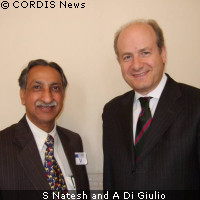EU and India to deepen biotech research ties
The EU and India are set to deepen their biotechnology research ties, particularly in the fields of food and health. A delegation from the EU recently visited India to discuss cooperation over issues such as the links between health and nutrition and how these can be exploited to help prevent chronic diseases. 'We went there with a group of leading EU scientists and we wanted to try to establish contacts with the food research community, which we didn't know very well,' explained Dr Antonio di Giulio, Head of the Food, Health and Well-Being Unit at the European Commission's Research Directorate-General. One of the highlights of the trip was a joint EU-India day at a major summit on nutraceuticals. Nutraceuticals (the word comes from combining 'nutrition' and 'pharmaceuticals') are dietary supplements made from food extracts, which are designed to have health benefits. They include antioxidants from berries, and oils from certain fish. The world market in nutraceuticals is worth over €50 billion. The US and Japan currently have the largest market share, but interest in these products is growing rapidly in both the EU and India. Both the EU and India are also interested in promoting research designed to find out more about these products and how they work. However, while nutraceuticals dominated the discussions, other topics also featured in the talks. 'We discussed aspects linked to personalised nutrition, we discussed aspects linked to how to prevent certain neurodegenerative diseases, like for instance Alzheimer's, with specific diets,' Dr di Giulio told CORDIS News. 'We also discussed more about how our gut flora will be enhanced with some food products.' Dr di Giulio described the trip as 'very fruitful'. 'I must say that I was very much impressed by the capabilities they have, by their way of thinking ahead and the way of collaborating that is really on an equal footing,' he commented. The feeling is clearly mutual; on a trip to Brussels to firm up cooperation in the food and nutraceuticals fields, Dr S Natesh, Head of International Cooperation at the Department of Biotechnology of the Government of India, told CORDIS News why India is so keen to work with the EU. 'The EU is a very important region for us. We have a lot of respect for the kind of research and innovation in the EU region, and more importantly we perceive that there are complementary strengths between the EU and India,' he stated. 'We are very strong on manufacturing capabilities and services, and now we're slowly moving into discovery and innovation. And the EU has traditionally been a region where a lot of innovation has taken place. So we feel that by marrying both our strengths, we could help bring in more synergy into this entire enterprise and look for new products, processes, public good research and so on.'
Countries
India



